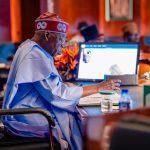In a move that is already generating buzz across Nigeria’s political landscape, Professor Joash Ojo Amupitan (SAN)has been officially approved as the next Chairman of the Independent National Electoral Commission (INEC).
The approval came after President Bola Ahmed Tinubu presented his nomination to the National Council of State, which unsurprisingly unanimously endorsed the appointment.
According to a State House press release signed by Bayo Onanuga, the President’s Special Adviser on Information and Strategy, the 58-year-old legal scholar from Ayetoro Gbede, Ijumu Local Government Area of Kogi State, becomes the first individual from Kogi and the North-Central region to hold the top electoral position.
But behind the formalities of academic credentials and constitutional procedure lies a growing unease: a familiar sense that, once again, “a brother has been put in place.”
The Official Story: An Academic Giant with a Legal Pedigree
Professor Amupitan comes with an impressive résumé. A Professor of Law at the University of Jos, he specializes in Company Law, Law of Evidence, Corporate Governance, and Privatization Law. Called to the bar in 1988, he has published multiple authoritative texts, including “Documentary Evidence in Nigeria” and “Principles of Company Law.”
He earned his LL.B, LL.M, and PhD from the University of Jos and currently serves as its Deputy Vice-Chancellor (Administration). He also holds the position of Pro-Chancellor and Chairman of Council at Joseph Ayo Babalola University in Osun State. He was named a Senior Advocate of Nigeria (SAN) in 2014.
His public and private service roles range from academia to the corporate world, including board memberships at Integrated Dairies Limited and Riss Oil Limited, as well as advisory positions within national legal institutions.
The official press release paints the portrait of a seasoned academic with a sterling track record, a “neutral,” apolitical candidate meant to steady the electoral ship ahead of the 2027 general elections.
But Who Approved Him? The Real Power Behind the “Unanimous” Nod
While the Council of State’s endorsement was described as unanimous, it bears repeating who sits on that Council. The so-called consensus includes:
- Serving APC Governors, including Governor Ahmed Usman Ododo of Kogi, who praised Amupitan as “a man of integrity”.
- Former Presidents, most of whom have kept politically quiet.
- Top officials appointed by this same administration including ministers, advisers, and other loyalists.
In effect, the Council is stacked with individuals whose loyalty to the current government is either ideological or institutional.
The term “unanimous” becomes less meaningful when dissenting voices such as opposition governors or civil society stakeholders are either underrepresented or drowned out.
So, while the constitutional box has been checked, the perception that the President has “installed his own” a trusted son from the wider Yoruba political family persists.
Nominated Or Appointed?
At the heart of this unfolding drama is a deeper national question: Who really holds power in Nigeria’s democracy?
When key national institutions from the judiciary to the electoral commission appear increasingly populated by individuals from one party, one region, or one ethnic block, the line between election and selection begins to blur.
President Tinubu says Amupitan is “apolitical.” But so was Godwin Emefiele. So was Ibrahim Magu. So was Mahmood Yakubu until he wasn’t.
So, the question lingers, stubborn and unresolved








